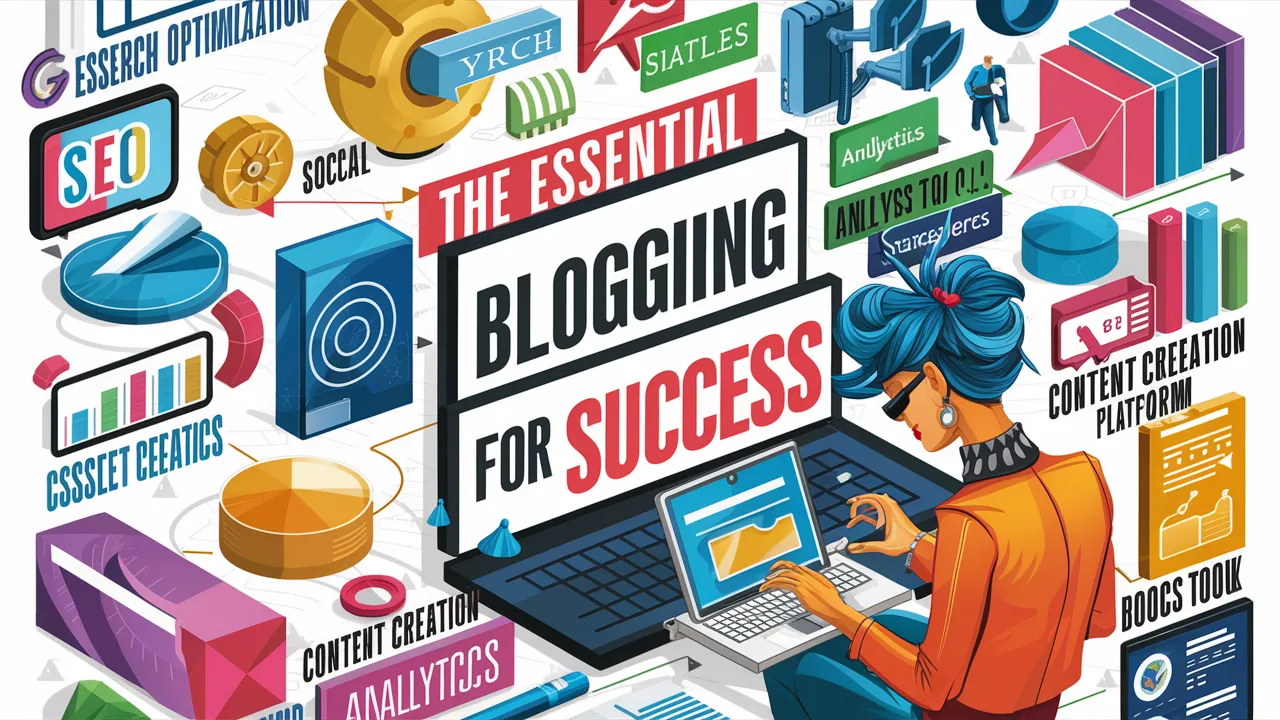Introduction
Blogging has evolved dramatically over the years. What started as a personal journaling exercise has become a vital tool for businesses, influencers, and creators worldwide. But to create a successful blog, you need more than good content—you need the right tools. In this article, we will explore the essential blogging tools that every blogger should know about, from content creation to SEO optimization, and even monetization.
Table of Contents
1. Content Creation Tools
As a content creator, crafting compelling and immaculate prose is paramount. To achieve this, one must wield the proper instruments, for they elevate content to its highest potential. These tools, like the fabled Excalibur, empower the writer to craft words that resonate, inform, and inspire. They are the chisels and mallets that sculpt raw ideas into masterpieces of written art. With the right tools in hand, the writer embarks on a journey of wordsmithing, transforming thoughts into a symphony of words that dance upon the page, captivating readers and leaving an enduring legacy.
Writing Platforms
Choosing the right writing platform is crucial. Popular choices like WordPress, Medium, and Blogger offer different features tailored to various needs. WordPress, for example, provides a highly customizable experience with countless plugins and themes, while Medium offers a more straightforward, minimalist approach with a built-in audience.
Grammar and Style Checkers
No one likes reading a blog riddled with grammatical errors. Tools like Grammarly and Hemingway Editor help you refine your writing by catching grammatical mistakes and suggesting style improvements. Grammarly checks for punctuation, context, and even tone, while Hemingway Editor highlights complex sentences, helping you write more concisely.
Idea Generation Tools
Every blogger hits a creative block sometimes. When inspiration is hard to find, tools like BuzzSumo and AnswerThePublic can spark new ideas by showing trending topics and common questions in your niche. These tools can help you understand what your audience is interested in, allowing you to create relevant content that resonates.
2. SEO Tools
To attract organic visitors to your blog, you must install effective search engine optimization. This is the best way to enhance your blog’s visibility on search engine results pages, especially when those pages are found in the vaults of a search engine like Google. To that end, using the right tools is half the battle.
Keyword Research Tools
Keyword research is the foundation of effective SEO. Tools like Ahrefs, SEMrush, and Google Keyword Planner allow you to discover the best keywords to target, analyze competitors, and track your rankings. These tools help you understand what your audience is searching for and how you can meet those needs with your content.
On-Page SEO Optimizers
Once you have your keywords, you need to optimize your content around them. Tools like Yoast SEO for WordPress provide real-time feedback on your on-page SEO efforts, including keyword usage, readability, and meta descriptions, helping you create SEO-friendly posts that rank better on search engines.
Backlink Checkers and Analysis Tools
Backlinks are a significant factor in SEO ranking. Tools like Moz Link Explorer and Ahrefs Backlink Checker allow you to analyze your backlink profile, discover opportunities for building new backlinks, and check your competitors’ strategies. This helps in crafting a more robust SEO strategy.
3. Visual Content Tools
Visual content is key to keeping your audience engaged. Whether it’s images, infographics, or videos, visual elements can significantly enhance your blog’s appeal.
Image Editing and Creation
Creating eye-catching images is easier with tools like Canva and Adobe Photoshop. Canva offers user-friendly design tools with a variety of templates, while Photoshop provides more advanced features for detailed image editing.
Infographic Generators
Infographics can help present complex information in a more digestible format. Tools like Piktochart and Venngage allow you to create professional-looking infographics with ease, helping to convey your message more effectively.
Video Editing Software
With video content becoming increasingly popular, tools like Adobe Premiere Pro and Final Cut Pro are essential for editing high-quality videos. These tools provide a range of features from basic trimming to advanced effects, allowing you to create engaging videos for your blog.
4. Social Media Management
In the rapidly growing and besieged platform of social media, bloggers must use the “buy my [insert content type here]” bandwagon to draw in their audience. Wind the content promotion apparatus up and watch it go, and go—hopefully!—it goes. That’s the best metaphor I can come up with for social media management. … By sharing a post, and then engaging with those who respond to it in the brief space of time that it’s “fresh,” a blogger can push a freshly minted post beyond the social media tip line—this is a post that might make it into a reading list at some point down the road.
Scheduling and Automation Tools
Tools like Hootsuite and Buffer allow you to schedule posts across various social media platforms, saving time and ensuring consistent posting. These tools also offer analytics to help you understand which posts perform best.
Social Listening and Analytics
Knowing your audience is vital. Sprout Social and Brandwatch are two tools that offer deep insights into audience demographics and engagement levels. They also let you peek into your audience’s minds for a second by revealing what’s currently trending with them. All this intel helps you super fine-tune your social media strategy.
Content Curation Tools
At times, it can be beneficial to share pertinent content from other creators with your audience. Tools such as Feedly and Pocket assist in discovering and gathering content that is congruent with the theme of your blog and help maintain an up-to-date, social media presence that is pretty much the opposite of stale.
5. Analytics and Insights
It is vital to comprehend the performance of your blog if you wish for it to grow. Tools that gauge analytics present us with a much clearer picture of the audience we are attempting to engage and lead.
Web Analytics Platforms
The preeminent standard for web analytics is Google Analytics. It provides detailed insights into your blog’s traffic, including where your visitors come from, what they do on your site, and how they interact with your content. This data helps you understand your audience better and tailor your content to their needs.
Heatmaps and User Behavior Tracking
Tools like Hotjar and Crazy Egg provide heatmaps that show where users click, scroll, and hover on your site. Understanding user behavior can help you optimize your blog’s layout and improve user experience.
Social Media Analytics
When it comes to analyzing performance on social media, platforms like Twitter and Facebook provide two very good options: Twitter Analytics and Facebook Insights. Both are free to use and straightforward, although Facebook Insights is a more powerful tool due to the sheer number of metrics Facebook collects. That said, the actual important insight most people glean from either of these tools is fairly similar.
6. Monetization Tools
For many bloggers, the ultimate goal is to make money from their blogs. Thankfully, several available tools can transform one’s love of blogging into a profitable venture.
Affiliate Marketing Platforms
Affiliate marketing is a popular way to earn money through your blog. Platforms like Amazon Associates and ShareASale allow you to earn commissions by promoting products and services relevant to your audience.
Ad Networks and Management Tools
Another potential income stream from your blog can come via ads. Tools like Google AdSense and Mediavine help you manage ad placements and optimize your earnings, ensuring you get the most out of your traffic.
Subscription and Membership Tools
For bloggers with a loyal audience, subscription models can be lucrative. Tools like Patreon and Memberful allow you to offer exclusive content to paying subscribers, providing a steady income stream.
7. Email Marketing Tools
Building an email list is one of the most effective ways to keep your audience engaged. Email marketing tools help you manage and grow your list.
Email List Building
Tools like ConvertKit and Mailchimp offer powerful features for building and managing your email list. They provide customizable sign-up forms and landing pages, making it easier to convert visitors into subscribers.
Automation and Segmentation
Email marketing success often depends on personalization. Tools like ActiveCampaign allow you to automate email campaigns based on user behavior and segment your audience for more targeted communication.
Analytics and A/B Testing
Understanding what works is key to improving your email campaigns. Tools like HubSpot offer robust analytics and A/B testing capabilities, allowing you to test different subject lines, and content, and send times for optimal results.
8. Collaboration Tools
Blogging often involves collaboration, whether it’s with guest writers, editors, or marketing teams. Effective collaboration tools can streamline the process.
Project Management Software
Tools like
Trello** and Asana help you manage tasks, set deadlines, and collaborate with team members, ensuring your blogging projects stay on track.
Team Communication Platforms
Communication is key to successful collaboration. Platforms like Slack and Microsoft Teams ease real-time communication, file sharing, and collaboration, keeping everyone on the same page.
File Sharing and Collaboration Tools
Sharing files and working together on documents is easier with tools like Google Drive and Dropbox, which provide secure cloud storage and real-time collaboration features.
9. Security and Maintenance
Keeping your blog secure and well-maintained is crucial to prevent data loss and protect against cyber threats.
Backup and Restore Solutions
Regular backups are essential for data security. Tools like UpdraftPlus and BackupBuddy allow you to schedule automatic backups and easily restore your site if needed.
Security Plugins and Software
Protecting your blog from cyber threats is vital. Plugins like Wordfence and Sucuri offer comprehensive security features, including malware scanning, firewall protection, and login security.
Performance Monitoring Tools
Ensuring your blog loads quickly is crucial for user experience and SEO. Tools like Pingdom and GTmetrix help you check your site’s performance and provide suggestions for improvement.
10. Expert Insights
Gaining knowledge from professionals can offer powerful understanding and prevent you from making run-of-the-mill blunders.
Quotes from Blogging Experts
“Content is king, but distribution is queen, and she wears the pants.” – Jonathan Perelman. Insights like these from experts remind us that creating great content is one part of the puzzle; promoting it effectively is equally important.
Common Mistakes to Avoid
Avoiding common blogging mistakes like neglecting SEO, failing to promote content, and inconsistent posting schedules can help you build a more successful blog.
11. Future Outlook
Blogging remains in a state of evolution that shows no signs of letting up, with new tools and trends coming along regularly.
Emerging Trends in Blogging Tools
Artificial Intelligence (AI) is making waves in blogging. AI tools like Jasper and Copy.ai help generate content ideas and even write drafts, allowing bloggers to focus on strategy and creativity.
AI and Automation in Blogging
The sophistication of automation tools continues to grow. Tools such as Zapier can take over the rote work of maintaining a blog, giving bloggers more freedom to concentrate on the core activities that define their craft—namely, producing work and interacting with their readership.
12. Conclusion
Blogging is more than writing—it’s about creating, optimizing, and sharing content in a way that resonates with your audience. By leveraging the right tools, you can streamline your workflow, enhance your content, and grow your audience. Start exploring these essential blogging tools today and take your blog to the next level







3 thoughts on “Essential Blogging Tools for Success: Boost Your Blog Today”
Comments are closed.